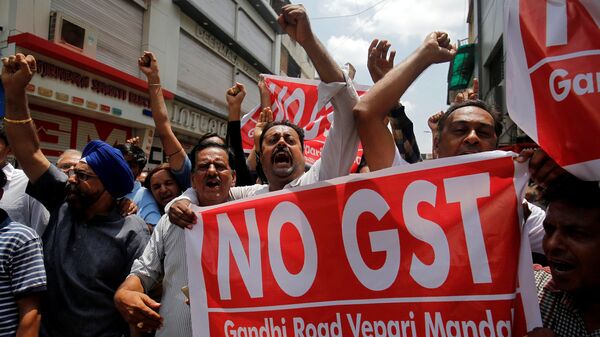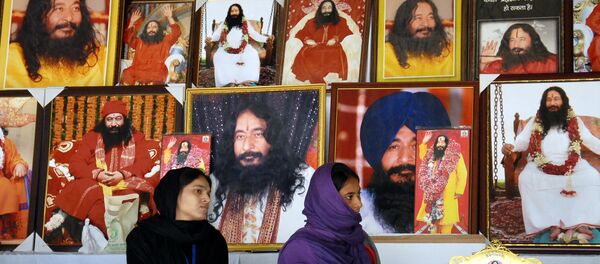India heralded the introduction of the GST in grand terms. Since the tax itselfwas much-wanted indirect tax reform to subsume at least 17 indirect taxes that were imposed on a product or services.
India's Parliament assembled for the historic midnight session on June 30 to announce the GST era, just like the midnight session when India got independence.
"Just as Sardar Vallabhbhai Patel unified India by helping several princely states subsume into a common entity, the GST will bring economic unification," Narendra Modi told the 1.25 billion people from Parliament's Central Hall.
Before GST, taxes included central sales tax, sales tax imposed by states which varied greatly and value-added tax which has a more recent history. Now all this was meant to streamline into GST. But India being a union with strong federal relations, the states objected to their tax collection being hit and led to the creation of the GST Council comprising finance ministers of all states and the Union Finance Minister.
The GST was meant to end with One Nation, One Tax but now it has two components, state and central.
Under the GST, every seller or service provider with an annual turnover of $30981 will have to register under the GST network that will keep records of daily sale and purchases of traders. Secondly, only one registration will be done against a PAN (an identity number for tax payers, traders and citizen). Thirdly, the government can penalize any company if it fails to pass the benefit of lower taxes to consumers. GST rules make it impossible to evade tax, as at every selling point there is a ‘virtual check post' which records every transaction of goods and services in the country. These are the issues for which traders are opposing the GST.
"We would have welcomed any tax regime which makes our life easier. But, GST is very complex. We have to file three returns in a month. For calculating purposes, I have to hire a person. In the time when sales are down, profit margins reduce, hiring a person would be an additional burden on us," Rajesh, a trader in New Delhi's Sarojini Nagar market, said.
Though the idea behind the GST is to increase tax collection by broadbasing it, traders are up in protest since they are being forced to pay tax when they haven't paid such a tax or any tax at all, ever. Also, the GST was meant to lower double taxation by the centre and the state government, making goods cheaper in some cases.
Textile traders want the GST rolled back while 50 million other traders want the tax structure redone. Even many openly threaten to go against government intention of getting more people under the tax ambit.
"Till now many goods such as textiles were not being taxed. Now, the government has imposed GST on these items. Earlier, we were doing 20 percent business on kachcha (informal) bills, now it will definitely go up i.e. tax evasion will go up under this regime," Sumit, a trader from Sadar Bazar in New Delhi, told Sputnik.
The government claims that it is impossible to evade tax under GST as rules suggest person involved in business (any one from manufacturers to dealers) will only receive input credit if his or her supplier has also paid his or her share of taxes. This means government will recover full tax at initial stage which will be returned back as input credit to traders or dealers once they provide sale details to the GSTN system. Under this system, every person in the supply chain will work as enforcement agency personnel.
"GST is very simple tax structure which provides tax rate for every commodity and service currently selling in the country. What you are witnessing today is not confusion about ‘disruptive' GST but it is resistance which unfortunately inhibited in the India's millions traders. Narendra Modi government has disrupted the habits of traders who usually avoid paying taxes," Harsh Vardhan Tripathi, a socio-economic analyst, said.
However, there is substantial growth in registration under GSTN in last fortnight. Traders have, somehow, started accepting the fact that one cannot run businesses as usual. "Modi has made our life hell. From next time, traders will vote anyone except Modi," another trader at Chandni Chowk said. Traders, an influential segment of Indian society, are considered core supporters of the ruling Bharatiya Janata Party.
"Every step taken by Modi seems disruptive in first instance which his opponents believe that they can snatch away core base vote from Modi. Presently, some of the business segments fumed at Modi but anger may pacify after they get familiar with GST as it will definitely makes their life easier including filing taxation," Tripathi added.
Government claims every products and services will be charged same in every nook and corner of the country. But, this is half true as companies which have factories in Himalayan states will continue to pay less tax. Also, states have started to levy a parallel tax such as 30 percent entertainment tax by southern state of Tamil Nadu and 2 percent additional duty for vehicle registration in Maharashtra. Petroleum products, electricity, liquor, stamp duty, registration charges and vehicle tax remain outside the purview of GST which means once again consumers will have to pay different prices for same products in different states (29 states, the 7 Union Territories). Thereby, mocking the entire premise on which GST was mooted.



